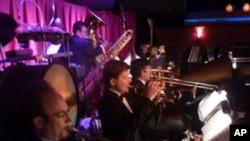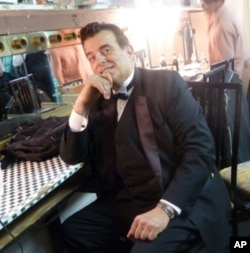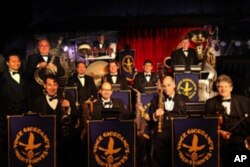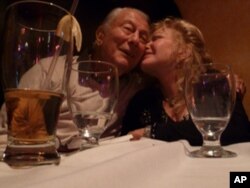It's been nearly a century since the big band music of the Jazz Age was in full swing, but a nighttime visit to a nightclub in the Big Apple might have you fooled.
On a recent Monday night at Sofia’s, a small nightclub in the Times Square theater district. Vince Giordano and the Nighthawks, resplendent in tuxedos, are onstage above the dance floor, hell-bent on taking their audience of aficionados, dancers and the merely curious back to the “hotsy-totsy” 1920s and 30s - all through the magic of the era’s big band sound.
Bandleader Vince Giordano alternates between string bass, tuba and saxophone. He's been in love with the music of that era since childhood.
“This music reflects a period of time in America when things were very upbeat. Maybe a little naive or experimental," Giordano says. "People had this great festive mood and they just wanted to live life to the fullest. They didn’t have much in the way of conveniences, but in their life they had a lot. These people were just excited about anything that came out that was new and different. They just went bonkers.”
According to Giordano, the exuberance of this music was new to 1920s America. The Jazz Age, often fueled by liquor despite Prohibition, contrasted with the restrained formality of the earlier Victorian era.
And although the music was all-American, its beating heart was New York, a fact not lost on the likes of Woody Allen, who often uses the Nighthawks in the soundtracks of his New York-based period films.
“The thing that is amazing about New York is that everybody, in all styles, wound up here, whether it was in ragtime - fellows like Scott Joplin - coming here in the early days," Giordano says. "You had the early jazz people like Louis Armstrong and James P. Johnson, the next generation of musicians - Benny Goodman and the Dorsey Brothers - they all came here to record, to be on the radio. The swing bands, the great bands up in Harlem, the bebop scene, everything came to New York. They all just sat down and had a feast."
The feast Giordano prepares every week takes hours of work. For example, he plans which pieces from his archive of 60,000 songs he'll feature.
“You’ve got the musicians that have to know this language. This is a special language to play this music. It’s something you have to study and you have to listen and then speak on your instrument," he says. "Back in the 20s, 30s, 40s, it was easy because everyone was speaking that language. But a lot of water has passed under the bridge since those times."
But for saxophone player and clarinetist Daniel Levinson, as with many of the other 10 Nighthawks, this music is modern enough.
“It doesn’t feel like nostalgia. When I hear this music, it feels natural to me and I forget that this music is 80, 90 years old. Playing this music is absolutely mesmerizing."
Romance is alive and well at Sofia’s. In a dimly lit booth near the bandstand, Sandy Sacheroff snuggles up to Bob Stichman, her longtime boyfriend, who's nearly old enough to remember when this music was new.
"A lot of young people, they don’t know this kind of music," Stichman says. "If more of them were introduced to this kind of music, I think they’d love it."
Sacheroff agrees. "The music is from the heart. It's so wonderful."
"And the dancing is marvelous," Stichman adds.
In fact, to judge by their perfect Charleston, lindy hop and jitterbug moves on the dance floor, many young - or at least young-ish - people have discovered this world.
You can tell by the look of concentration and joy in the faces of Vince Giordano and the Nighthawks as they plunge into another number, it’s a world they plan to inhabit for decades to come.







